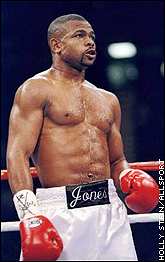



|

|
Tuesday, September 19
Bribe offer? Boxing officials will double it
By Tim Dahlberg
Associated Press
SYDNEY, Australia -- Olympic boxing has finally sunk to this -- even the people running it are now offering bribes.
|  | | Roy Jones Jr. was denied a gold medal by a controversial decision at Seoul in 1988. |
Actually, amateur boxing officials are going one better by giving Olympic judges and referees an offer they can't refuse -- double the bribe in cash for anyone reporting an attempt to influence the scoring of a fight.
If that doesn't work, spy cameras high above the ring in the Sydney Exhibition Center are trained on judges to help make sure there's no hanky-panky.
With boxing just fighting its way off the ropes as an endangered Olympic sport, desperate measures are being taken to keep it scandal-free in Sydney.
"We mean it," said American Loring Baker, who made the special double-your-bribe offer. "By doing this we are actually trying to eliminate the possibility of a bribe."
The logic might seem convoluted, but amateur officials hope just the fact the offer was made might be enough to keep the 35 referees and judges in line during the games.
That would be a change from previous Olympics, where questionable decisions raised suspicions of shady dealings and almost got boxing tossed out of the Olympics.
"We don't have any hard evidence of judges being crooked," said Baker, who is general secretary of the International Amateur Boxing Association, known as AIBA. "But we have to remove the shadow of doubt."
That shadow has lingered over amateur boxing for a long time. But it exploded into the public eye during the tumultuous Seoul Olympics in 1988, which ended with Roy Jones Jr. being robbed of a gold medal against a South Korean.
Amid calls to ban boxing from the Olympics, AIBA introduced computerized scoring to try to ensure boxers from any country got a fair break.
Problem was, there were still human judges punching the computer buttons.
That was evident only last year at the World Amateur Boxing Championships when four AIBA judges were suspended and their decision reversed after Russian welterweight Timour Gaidalov was given a victory over Cuba's Juan Hernandez.
The decision touched off a protest and Cuban heavyweight Felix Savon later refused to enter the ring for his fight with American Michael Bennett. Fidel Castro expressed his outrage, and a sports commentator on government-controlled television called the judges "miserable, corrupt people."
"You hear everything about that one bout and nothing about the other 298," Baker said. "We found out it was biased, and we took action."
In Sydney, the 35 judges and referees -- who sit together at ringside in matching white suits and bow ties when not working -- were selected only after going through a weeklong screening program in June in Kazakstan, where they judged fights in groups and had their scores compared with each other.
AIBA officials were at first shocked about how much the scores differed -- proving that an incompetent official can be just as bad as one who is corrupt. But as the week went on, the judging improved and 35 of the 53 in attendance were picked to work the Olympics.
The 35 have been under scrutiny from the opening bout. Besides the spy cameras, a special AIBA commission was formed just to keep an eye out for any problems. Scoring is analyzed daily, with commission members on the lookout for any discrepancies that might be suspicious.
"The judges and referees are very aware of the problems and the fact their performance has to be exemplary," Baker said. "We have
to prove the other people who criticize our sport wrong."
So far, so good, at least in the preliminary rounds in Sydney. The judges who push buttons they see a punch land -- three of the five must agree within one second for a punch to count -- seem to have gotten most decisions right in the first days of competition.
In Seoul, there were 37 scoring protests but only three in Atlanta. Through 71 bouts of these Games, there have been none.
"I think pretty much the scoring has been right on," U.S. coach Tom Mustin said. "I think they're picking up on the punches landing."
That doesn't mean, of course, that boxing is home free. Which is precisely why Baker made his bribe offer.
"The various ways to shade the scoring with the computer we've greatly diminished the possibility of doing that and it going
undetected," Baker said. "But it's an ongoing process."
|  | |
|







